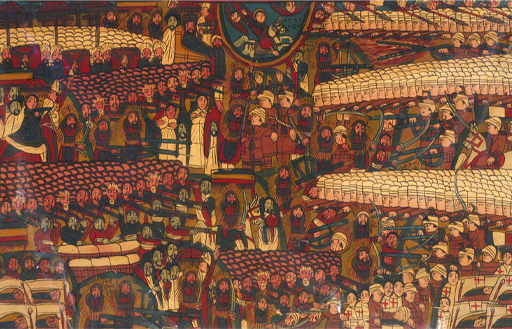1 Resisting colonisation: the Battle of Adwa,1896
Ultimately European control in Africa rested on violent conquest, or the threat of violence. This section will examine open resistance by African states to initial European expansion.
On 1 March 1896 the Ethiopian empire defeated Italian attempts at conquest in a pitched battle at Adwa. The Italians were forced to give up their plans to conquer the interior (although they continued to occupy Eritrea), and Ethiopia won international legitimacy as an independent state. Ethiopia was one of very few African states to preserve its independence over the course of the post-1884 European ‘Scramble for Africa’. It did so by military resistance, but this also involved diplomatic and religious elements.
This military resistance was not temporary (as had been the Sudanese Mahdist victory in 1884 or the Zulus in 1879) but endured for decades. Ethiopian success impacted on the way that it was perceived in Europe, for example, before the battle The Times referred to Ethiopia as ‘barbarous’, but after it was described as a ‘civilised power’ (Milkias and Metaferia, 2005). By winning the battle the Ethiopians demonstrated that they were a sovereign state rather than a prize to be conquered.
Europeans had been defeated by African forces during the nineteenth century, but these victories nearly all involved smaller detachments of imperial forces. Small African polities were relatively easy to defeat militarily, and African coalitions might be divided. When the Europeans invested in transport and supply, they were able to bring overwhelming force and ruthless skill to bear. What made the difference at Adwa?
Adwa was different in that Emperor Menilik II (1844–1913) had spent years unifying the various local nobles who were independent rulers in their own right. He was aided by the political activity of his wife Taytu Betal (1853–1918), who had an independent power base linked to the nobility of northern Ethiopia, that complemented Menelik’s power in the south (Rubinkowska, 2012). This enabled him to amass an army of over one hundred thousand men and women.
After the battle, Menelik held a trump card: nearly two thousand Italian prisoners. These men were well treated and used as bargaining chips. Menelik’s demands were met: the Italians annulled the Treaty of Wuchale, recognised the full independence of Ethiopia, and paid an indemnity of $5 million in gold. This money, and the prestige associated with the victory, helped Menelik to further modernise the Ethiopian state, and to integrate it with the global system as a would-be equal – for example in 1896 Ethiopia joined the International Red Cross Society.
Menelik’s court also became an early incubator of Pan-Africanism. The Emperor himself did not claim any special place in the leadership of Africa or Africans, but the fact of an African victory over Europeans attracted many of those who wanted to see the continent, and African people, regain their independence. The Haitian Pan-Africanist Benito Sylvain visited the Emperor in January 1897 (Jonas, 2011). Later he attended the 1900 Pan-African Conference in London. Joseph Vitalien, a doctor from the Caribbean, stayed for years in Ethiopia. He attended the second Pan African Congress in 1921. Thus, there was a direct link between the independent Ethiopian state and the autonomous movement to liberate Africa. Adwa Victory Day is still celebrated by Pan-Africanists around the world.
Activity 1 The significance of Adwa
Professor Raymond Jonas published The Battle of Adwa: African Victory in the Age of Empire (2011). Here he discusses how Menelik II defeated the Italians and what that meant. Watch the film [Tip: hold Ctrl and click a link to open it in a new tab. (Hide tip)] and answer these questions:
- Why was the Battle of Adwa important?
- What elements does Jonas identify as important for Menelik’s victory?
- How was the victory viewed by people in Europe and America?
Discussion
- This was the first time that an African army had defeated a European force decisively enough to win a war. This called into question the European assumption that Africa was destined to become settled by European people in the way that the Americas had been.
- Menelik prepared before the conflict. He initially worked with the Italians to strengthen his leadership before eventually turning on them when he had consolidated his power enough to defeat them. He overcame internal division to make sure he presented a united force in response. He was also a brilliant strategist.
- The Battle of Adwa inverted the racial hierarchy of the day. It destabilised ideas of racial superiority that underpinned European imperial projects. The press in America tried to find ways of presenting Menelik as Europeanised – they needed to find a way of understanding events that fit into their ideological view of race.

